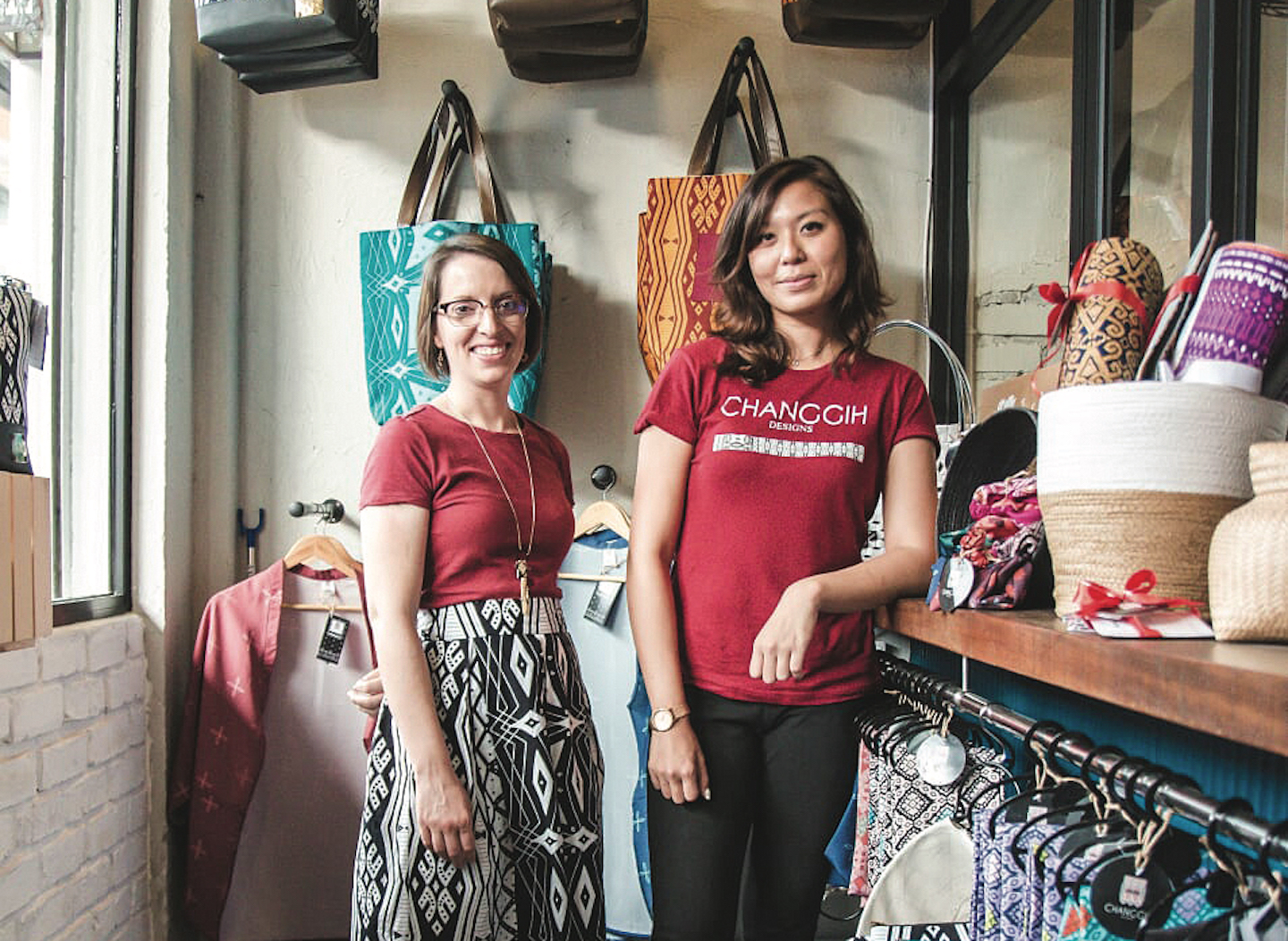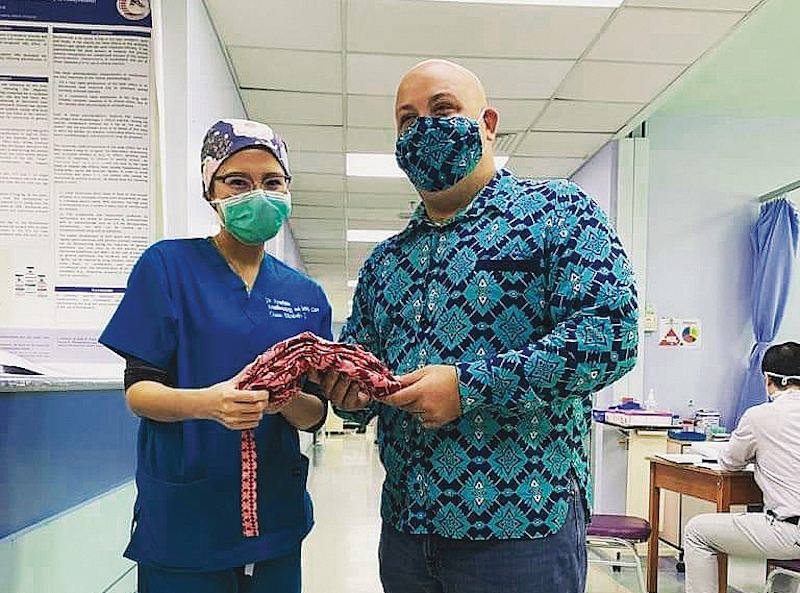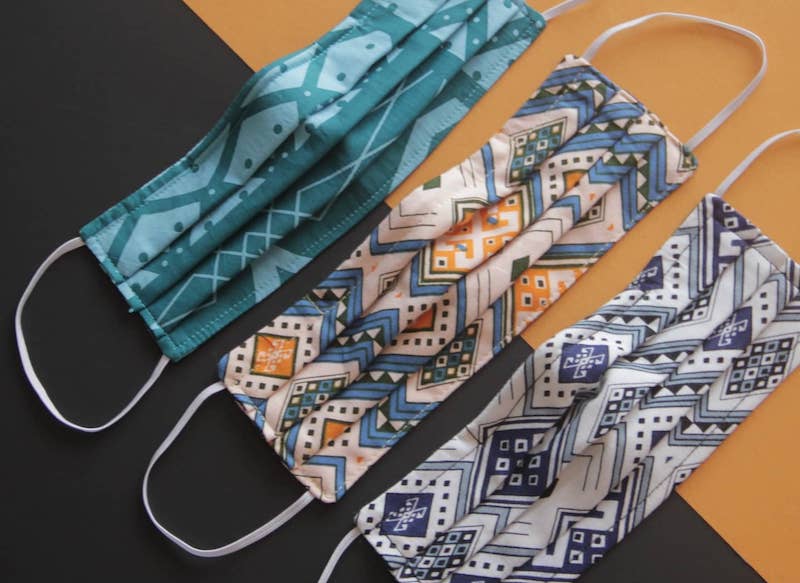
Founders of Changgih Designs: Bethany Dawson (left) and Joanna Moss (Photo: Changgih Designs)
The third wave of Covid-19 infections has hit Malaysia hard. An average of 800 new cases a day and more than 260 deaths have been recorded so far. Many businesses have not been able to sustain their operations and countless more people left unemployed and unable to feed their families.
The team behind Sabah-based social enterprise Changgih Designs has decided to step up and help out again. “The first time we were in lockdown in March here, we started a fundraising campaign and were able to feed roughly 2,000 people. That is about 400 food bundles for families in need,” says Allen Dawson, head of its social responsibility arm Changgih Gives Back.
They found communities who needed aid by developing a network of contacts. “What kick-started the idea was an article I had read in a newspaper that highlighted such plights. I called the contact person and she had a list of people who were struggling. Then, I looked for others like her. These contact points are key people who help identify communities that are in need,” he says.
This hands-on approach is an integral part of Changgih Designs’ DNA. About five years ago, founders Bethany Dawson and Joanna Moss were new mothers trying to find a creative outlet. The two bounced some ideas around, including coming up with exercise videos and selling crafts through mummy groups. They eventually settled on something that would help other mothers too.
allen dawson

“We decided that, rather than making the crafts and having them turn out horribly, we could design them and work with local artisans to give jobs to other mums who — like us — want to be home with their babies but also want to work so they don’t lose their identity and do something professional outside of their family. So, when Changgih started, the goal was to give us work and give other mums work so they could be home with their kids and schedule their work around times that were convenient,” says Bethany.
The two friends went out to villages and spoke to random individuals, hoping to enlist artisans and seamstresses for their venture, and they certainly were not waylaid by the naysayers. “People said to us, ‘This is a great idea, but it’ll never work. You’ll never get such high quality’. Jo and I were like, ‘Oh yeah, watch us’. That really gave us the fire in the beginning to really dig in,” she says.
Changgih Designs started with a line of baby clothes, which included bibs, onesies and even baby shoes, but the fit wasn’t quite right. “Scarves, which is what we did next, was what really kicked us off,” says Moss. “Beth had gone back to the US to visit family and I had packed in her suitcase some scarves that we had made with our first artisan. She took these to an art market on a Sunday and they sold like hotcakes. And then they sold here too in our tropical weather, all because they were statement pieces. That really gave us our growth here in Sabah.”
While the scarves made customers take notice of Changgih Designs, the bags that followed were on another level. The partners registered their social enterprise in November 2017 and have since focused on women’s apparel, bags and other accessories. Their sense of style, punctuated by their brand name, is truly canggih (modern/sophisticated). Determined to give back to the community, the social enterprise donates 10% of its profits to numerous projects, including disaster relief after floods, job training courses and skill-based vocational training.
One of their main challenges is with their fabric supply. “Sourcing is really tough and we are on an island, so there is a lag time. If we want to make something and test it out, and it sells very well, there is a lag time between ‘wow that worked’, the item being out of stock and then getting it back into production. We would have to guess how well something was going to sell before we bought the materials,” says Bethany.
face_mask.jpg

While most fabrics are sourced locally and internationally, Bethany — the designer of the team — also uses traditional Sabahan motifs that she had learnt about from the locals and incorporates them into the prints, creating unique patterns for their wares.
Changgih Designs is very people-centric. “We really want our business to be a family and for people to have ownership, and not feel like, ‘I do this to get a paycheque and I work for these people’. We want it to be, ‘I work with these people’,” she says.
Appointed head artisans work closely with the team to determine prices and help gauge whether the new ideas are workable. Changgih Designs also has a training programme taught by the head artisans in place to keep their crafters’ skills sharp and ensure they all diversify their range so they can craft bags and blouses, for instance.
While sales have been mainly through artisan markets and occasionally through social media over the past few years, the pandemic has forced the team to change tactics. “We have had to pivot very quickly. In Sabah, our sales were pretty much from the markets and our retail locations. And because of the current situation, retail is a little slow if not closed down. So, we had to switch very quickly to online,” says Moss.
Revamping their website and focusing on their online business turned out to be a steep learning curve, one that was approached with the same determination that had kick-started their venture.
Changgih Designs recently launched its second Masks & Meals fundraiser to help feed struggling Sabahan families, and hope to reach its goal of RM20,000. The company aims to feed 500 families and provide as many reusable masks as possible. “We’re loose with expectations and thankful for whatever we get. We are overwhelmed and humbled that people have been so generous. So, if we reach our goal, we will remain thankful while continuing to connect people who have with those who do not,” says Allen.
Apart from creating new designs for its collection, Changgih Designs wants to help more people in the future. Previously, its main clients were companies that made bulk orders to be used as corporate gifts, and the team hopes to attract more companies like these. “This has been a tough year and I think there will be a lot of people looking for jobs over the next year. Our goal is to get into the Kuala Lumpur scene or overseas and do wholesale orders,” says Bethany.
“We have the business, the fabrics, the training programme … the whole system. So, if we have more wholesale or corporate orders, we will be able to employ and train more people. I would love to see us double our workforce because if we can do that, it means many more families will be able to have some stability. It is an ‘us’ thing, a kita thing.”
This article first appeared on Nov 9, 2020 in The Edge Malaysia.


